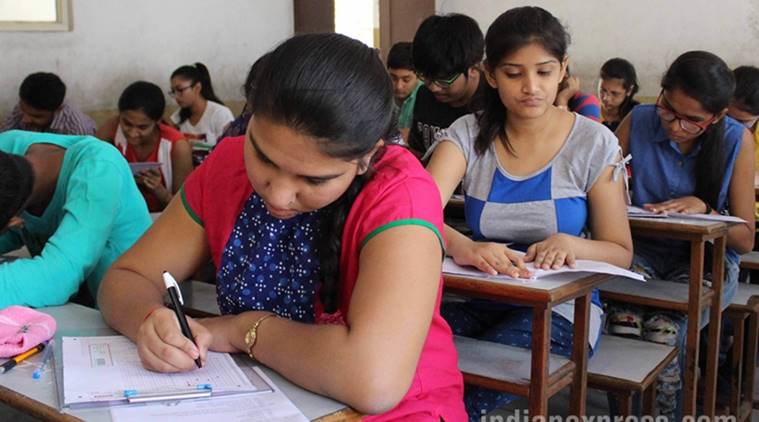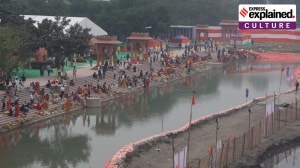NEET in J&K: The issue is constitutional, political
The main opposition National Conference has described it as an “infringement” on the state’s “special status and autonomy”, and former Chief Minister Omar Abdullah has criticised the Supreme Court for going beyond its purview to uphold NEET in J&K.
 The BJP, the PDP’s coalition partner, is celebrating NEET in J&K, while the separatists have come out publicly against it.
The BJP, the PDP’s coalition partner, is celebrating NEET in J&K, while the separatists have come out publicly against it.There is a massive outcry in J&K against the Centre’s decision to bring the state under the single, national-level National Eligibility Entrance Test (NEET) for admission to medical and dental colleges across the country. The main opposition National Conference has described it as an “infringement” on the state’s “special status and autonomy”, and former Chief Minister Omar Abdullah has criticised the Supreme Court for going beyond its purview to uphold NEET in J&K. The ruling PDP isn’t supporting the move, at least not publicly, and insists the state government has taken a line against it — even though NC chief Farooq Abdullah says the party’s “failure” to keep NEET out of J&K shows its “complete integration into the BJP”. The BJP, the PDP’s coalition partner, is celebrating NEET in J&K, while the separatists have come out publicly against it. Public opinion on the ground is largely against extending the entrance test to the state.
Why is there so much opposition to what is intended to be a measure to streamline the admission process for MBBS and BDS, and bring down malpractices and corruption?
Underlying the opposing lines taken by the partners in the state government as well as the opposition is the location and nature of their support bases. The PDP and NC, which draw support primarily from the Valley and the hilly districts of Doda, Rajouri and Poonch, are opposed to NEET, while the BJP and its base in Jammu province are supporting it.
[related-post]
J&K has four medical colleges (three of which are government-run), and two government-run dental colleges. The reason for opposing or supporting the exam has nothing to do with the nature of medical education or the admission process. It is a political issue. Although the BJP says that a national-level test will help stop malpractices and corruption in the admission process, it sees NEET as a step towards the integration of J&K with the rest of India. Conversely, much of the public discourse in the Valley is driven by suspicion that makes the NEET appear as part of a pattern of Delhi’s creeping expansion into Kashmir — seen earlier in plans to set up separate enclosures for retired soldiers and migrants, and moves to allow transfers of land for non-local industries on lease.
The J&K government’s written submission before the Supreme Court on March 17, 2011 explains why the NEET issue isn’t about the admission process. Its main argument was that bringing J&K in the ambit of NEET would be a violation of the Constitution, and an infringement on the special status of the state.
The government had referred to Dr Dinesh Kumar and Ors vs Motilal Nehru Medical College and Ors (May 1985), in which the SC had directed the Centre to hold a single national level test, observing that “there can be no constitutional impediment in the way of the Government of India or the Indian Medical Council for holding such entrance examination, because the topic of education is in the Concurrent List”.
This reference to Entry 25 of List III (Concurrent list) of the Seventh Schedule of the Constitution, J&K’s written submission said, is “vital” because it proves why the Centre “cannot compel” J&K “to participate in any All-India Entrance Examinations for admission to courses in the medical colleges within the State”. In J&K, unlike in other states, “the subject of education, including technical education, medical education and universities, is within the absolute residuary domain of the State” — because “Entry 25 of List III… (in) J&K” is limited to “vocational and technical training of labour” only.
The reason for this peculiarity lies in the applicability of the Indian Constitution to J&K. The state government argued that because of the special status, the constitutional relationship between J&K and the Centre is governed by Section 5 of the Constitution of J&K read with Article 370 of the Constitution of India and various executive orders issued by the President of India under that Article.
“The Constitution of India (as well as the constitutional scheme thereunder) do not apply in their entirety to… Jammu & Kashmir, but are subject to certain limitations and exceptions,” the J&K government argued. “A review of Article 370(1)(c) and Article 370(1)(d)… makes it clear that only those provisions of the Constitution of India are applicable to Jammu & Kashmir as are specified by the President by an order…”
The first such executive order was issued in 1954 — the Constitution (Application to Jammu & Kashmir) Order, 1954 — which was amended repeatedly to extend provisions of the Indian constitution to J&K from time to time. Successive central governments have been accused of using these Presidential executive orders as a “tool to erode the special status of J&K through the backdoor”, and “override the provisions of the J&K Constitution”. They can be issued only with the concurrence of the state government. There have been 41 such executive orders, each of which was an amendment to, or modification of, the 1954 order. The Centre, through these Presidential orders, extended 94 out of 97 entries in the Union List to J&K, and made applicable to the state 260 out of 395 articles of the Indian Constitution.
That is why, the J&K government argued, “provisions of the Constitution, as applicable to J&K, are quite different from the Constitution, as applicable to the other parts of the Union of India”, and List I (or the Union List) and List III, as applicable to J&K is not the same List I and List III as applicable to other states.
The state’s submission also referred to Article 368, which describes Parliament’s power to amend the Constitution, and its procedure, which explicitly says that “no… amendment shall have effect in… Jammu and Kashmir unless applied by order of the President under Clause (1) of Article 370”.
Education was not in the Concurrent List until the 42nd amendment of 1976, and amendment to Entry 25 of List III. But this amendment, the J&K government maintained, wasn’t made applicable to the state through a Presidential order as per Article 370(1) — and, because a constitutional amendment is not automatically applicable to J&K, medical education remains a state subject. Under section 5 of the J&K Constitution, the “executive and legislative power of the State extends to all matters except those in respect of which Parliament has power to make laws for the State”.
Thus, “the arrangement with respect to the division of legislative powers between Parliament and the State Legislature… is unique and unparalleled”, J&K argued. “The power of the State Legislature… is unfettered, exclusive and absolute, in respect of all the matters except those that are mentioned in List I (i.e., the Union List) and List III (i.e., the Concurrent List)… as applicable to the State…”
The only candidates eligible to appear for an entrance test for admission to J&K colleges are the permanent residents of the state, “as defined in Section 6 of the J&K Constitution”.
“Such policies, framed in order to protect the interest of the permanent residents of J&K are protected by Article 35A of the Constitution of India,” the J&K government argued. “Besides, every new entrant into the Government service (including Health Services) can only be a permanent resident.”
Should the Centre bring J&K under NEET without an executive order issued by the President to make it applicable to the state, it would be the first major breach in the constitutional arrangement between J&K and the Centre under the current dispensation. This is also why the BJP is happy, and the PDP is trying its best to control damage through perception management.



- 01
- 02
- 03
- 04
- 05



































